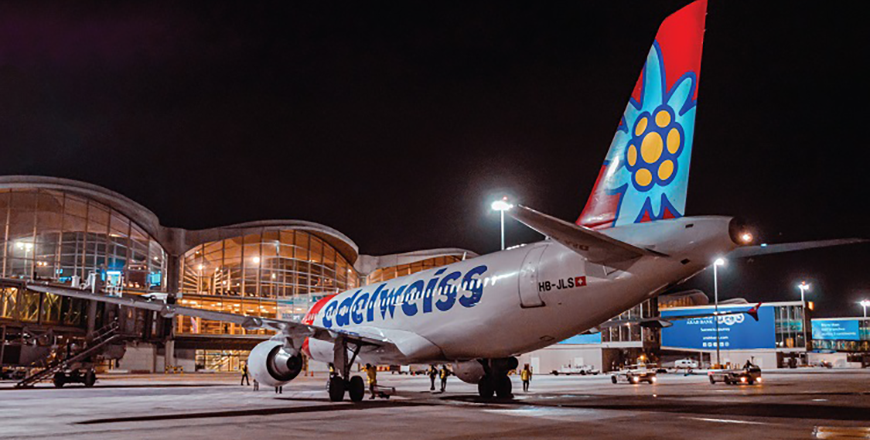You are here
Lufthansa values Jordan’s operations
By Ghaith Madadha - Feb 06,2014 - Last updated at Feb 06,2014
AMMAN — Lufthansa’s Amman route is in rude health despite continued unrest in parts of the Middle East and a tough economic climate for the aviation industry, according to the German carrier’s director of communications, Aage Duenhaupt.
“Jordan has been a safe haven”, Duenhaupt said , announcing a 5 per cent year-on-year rise in passengers number on the Amman route for 2013 during the Jordan leg of a whistle stop tour of Lufthansa’s Middle East operations.
He revealed that there has been a noticeable shift in tourist numbers travelling to Jordan in lieu of Egypt, and that Oman has also benefited from increased tourism owing to continued Arab Spring unrest.
With over a million passengers travelling from the region to Germany, Europe and beyond, 2013 has been a record year for Lufthansa’s operations, while the Amman route has accounted for 100,000 passengers in 2013, he pointed out.
With no safety or security concerns in flying to Jordan, Duenhaupt anticipates a similar 5 per cent rise in 2014 stressing that Lufthansa will be looking to develop the Amman route to attract more tourists from Germany and Europe, as well as expanding its Amman to North America — via Frankfurt — routes, which proved to be particularly popular.
While 700 flights on the Amman route in 2014, Duenhaupt said that if all goes well and it is economically viable, Lufthansa would be open to operating more flights in future.
While there has been some decline in tourist passengers for some regional destinations, Duenhaupt stressed that the Jordanian route has grown in terms of both tourist and business passengers and that there is “much optimism in our operations in Amman”.
Maha Lueck, Lufthansa general manager in Jordan, said: “We have to focus on Jordan as a single destination” rather than as part of a multistop regional destination, in light of prevailing conditions in Egypt and Syria.
Duenhaupt said Jordan’s weather, cultural heritage and safety are in its favour, while Lueck added that the country’s religious sites and that no vaccinations are needed, make it an attractive all-year tourist destination for Europeans.
According to Duenhaupt, Lufthansa carries a high proportion of business travellers to Amman, as does its Austrian Airlines subsidiary, which also benefits from strong relationships between Austria and the Middle East.
In reference to Easyjet’s recent withdrawal from Amman, Duenhaupt underlined the German legacy airline’s confidence in and commitment to the Jordanian route, and reliability for passengers, stating that “our approach is different. We have been here since 1976 and are here to stay” and that “we have always been reliable partners, not like other airlines who shift quickly if the financial environment is changing”.
Stating that Lufthansa has a different philosophy and business model to budget carriers, Duenhaupt explained that airlines like Easyjet rely on a “monothematic” approach of flying passengers in and out of one location, with only one destination from Amman, while Lufthansa offers over 200 destinations out of Jordan.
Duenhaupt explained that Lufthansa fills their plane differently, with a multidestination approach, where Frankfurt is a springboard or connection hub to other destinations, while Lueck added that “Lufthansa offers more connections to Europe, North America and beyond than any other carrier.
Duenhaupt indicated that the airline’s Jordan route is popular with business travellers, who account for 30 per cent of flyers, and generating more money than the 70 per cent leisure travellers.
On the issue of airport fees and recently raised ticket taxes, Duenhaupt said Lufthansa certainly looks to minimise such costs as much as possible within an international framework, but that low cost airlines might have unrealistic expectations for exemptions.
He added that Lufthansa is always interested in good infrastructure and that the new Queen Alia International Airport (QAIA) building seems impressive.
Asked about his view of QAIA becoming a regional hub, Duenhaupt described the new airport as an important milestone in that direction, but that government investment is necessary.
Citing Dubai’ and Istanbul’s meteoric rise to regional hub status in around 10 years compared to European airports’ average 30-40 years in the past, Duenhaupt wondered about how often this could happen.
Related Articles
LONDON — British low-cost carrier easyJet announced on Saturday it had agreed to buy part of bankrupt carrier Air Berlin’s operations at the
AMMAN — Three regular easyJet flights arrived in Aqaba carrying 470 tourists from Berlin, London and Geneva, the Aqaba Airports Company (AAC
AMMAN — Queen Alia International Airport (QAIA) welcomed from Zurich on Thursday, the first flight of Edelweiss Air; the leading leisure air



















